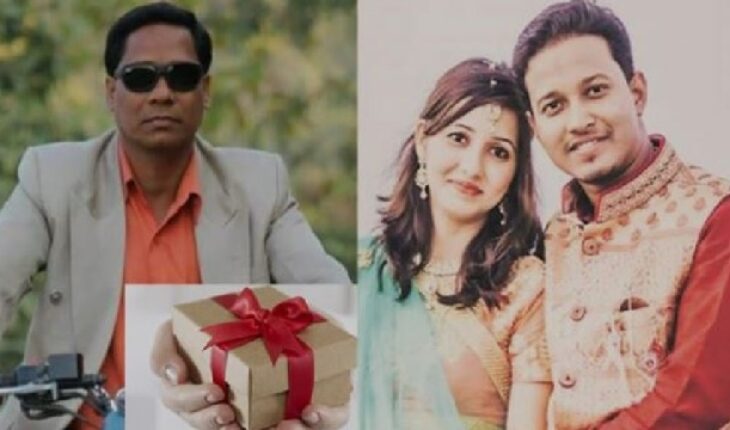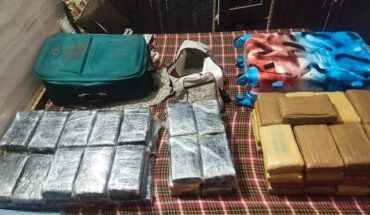Bhubaneswar: The sensational Patnagarh parcel bomb case has finally reached its conclusion with a court in Odisha finding the accused Punjilal Meher, a former college principal in Bolangir district, guilty of killing two persons and sentencing him to life. Meher, whose criminal act has inspired a movie, had sent a parcel bomb as gift to the house of a colleague-turned-rival in 2018 and the bomb killed her newlywed son and his great aunt.
The court of Additional District Judge, Bolangir, found 56-year-old Meher guilty of murder, and use of explosives in what came to be known as the “wedding bomb” case that sent shockwaves across the country.
The court had recently completed the trial in the case, nearly seven years after the shocking incident that killed software engineer Soumya Sekhar Sahu and his great aunt Jemamani Sahu. The court also imposed a fine of Rs 50,000 on Meher on two counts of murder and for causing grievous injury.
The case dates back to 23 February 2018, when a wedding gift was delivered at the residence of 26-year-old Soumya, just days after his marriage. When opened, the box exploded, killing Soumya and Jemamani. Soumya’s wife, Reema Sahu, sustained critical injuries.
After the local police failed to make any headway in the case, the Odisha government handed over the investigation to the Crime Branch, led by then-IG and Additional DG-rank officer Arun Bothra. Following meticulous investigation and evidence gathering, the Crime Branch traced the case back to Meher, a lecturer at Jyoti Vikash College.
The probe revealed that Meher held a grudge against Soumya’s mother, Sanjukta Sahu, who was his colleague and had replaced him as the principal of the college. To exact revenge, he sent a parcel bomb disguised as a wedding gift to her son.
For the Crime Branch, the case was particularly challenging due to the careful planning that went into assembling and delivering the bomb without leaving any significant clues that could lead back to Meher.
However, Bothra and his team eventually cracked the case, and Meher was arrested in April 2018, two months after the incident.
Soumya had married Reema, a native of Ghantrapada in Boudh district, on 18 February, and the reception was held at their Patnagarh residence on 20 February. On February 23 two individuals arrived on a motorcycle and delivered a packet to Soumya, claiming it was a wedding gift. When he opened the gift in the presence of his wife, mother, and grandmother Jemamani, the parcel exploded, leaving the couple and Jemamani seriously injured.
Though the injured were rushed to the district headquarters hospital in Balangir, Jemamani was declared dead. Soumya was shifted to VIMSAR in Burla, where he succumbed to his injuries. Reema had to undergo extensive treatment before she could recover from her injuries.
While acknowledging the prosecution’s argument that it was a “heinous” crime, the court declined to classify it as a “rarest of the rare” case deserving the death penalty. But the ingenious and deadly method used by Meher to exact revenge from his former colleague left the entire country stunned.
He used a false name and address to mail the bomb from Raipur, choosing a courier service without CCTV or parcel scanning. The bomb travelled over 650km by bus, passing through multiple hands before being delivered. Investigators said it was a crude but deadly device wrapped in jute thread, rigged to detonate on opening.
The parcel carrying the explosive bore a fake name – SK Sharma from Raipur. Weeks passed with investigators finding no clear suspects. They scoured thousands of phone records and interrogated over 100 people, including one man who had made a threatening call after Reema’s engagement – but nothing stuck. Then, in April an anonymous letter reached the local police chief. It claimed the bomb had been sent under the name “SK Sinha,” not Sharma, and cryptically mentioned motives of “betrayal” and money.
The letter claimed three men had “undertaken the project” and were now “beyond police reach”. It cited the groom’s “betrayal” and money – hinting at a scorned lover or property dispute – as motives. It also asked police to stop harassing innocents.
The letter was the turning point in the investigation. Arun Bothra, who was then heading the Odisha’s crime branch, noticed that the handwriting on the parcel’s receipt had been misread: it did resemble “Sinha” more than “Sharma.”
The letter writer seemed to know this – something only the sender could have known. The investigators now believed the suspect had sent the letter himself. The victim’s mother recognised the letter’s writing style and phraseology as that of her colleague, Meher, a former principal she had replaced. That made him prime suspect. He cracked under sustained questioning and the case was solved.






